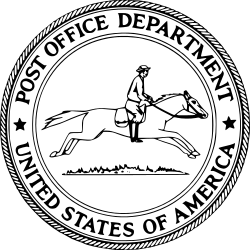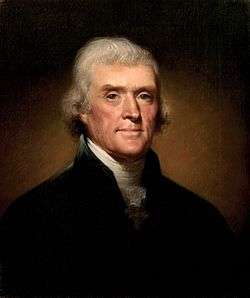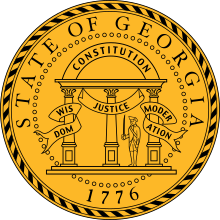Joseph Habersham
Joseph Habersham (July 28, 1751 – November 17, 1815) was an American businessman, Georgia politician, soldier in the Continental Army, and Postmaster General of the United States.
Joseph Habersham | |
|---|---|
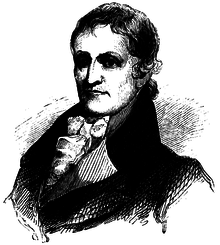 | |
| 3rd United States Postmaster General | |
| In office February 25, 1795 – November 28, 1801 | |
| President | George Washington John Adams Thomas Jefferson |
| Preceded by | Timothy Pickering |
| Succeeded by | Gideon Granger |
| Speaker of the Georgia House of Representatives | |
| In office 1782 2nd Adjournment - 1782 3rd Adjournment 1785 | |
| Mayor of Savannah | |
| In office 1792 1793 | |
| Personal details | |
| Born | July 28, 1751 Savannah, Georgia, British America |
| Died | November 17, 1815 (aged 64) Savannah, Georgia, U.S. |
| Political party | Independent |
| Education | Princeton University |
| Military service | |
| Allegiance | |
| Branch/service | Continental Army |
| Rank | |
| Battles/wars | American Revolutionary War |
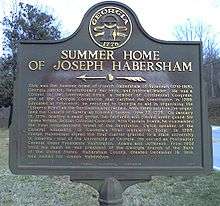
Early years
Born in Savannah, Georgia, to James Habersham and Mary Bolton, he attended preparatory schools and Princeton College and became successful merchant and planter. He was married to Isabella Rae, who was the sister-in-law of Col. Samuel Elbert.[1] They had one son, Robert Habersham.
American Revolution
He was a member of the council of safety and the Georgia Provincial Council in 1775 and a major of a battalion of Georgia militiamen and subsequently a colonel in the 1st Georgia Regiment of the Continental Army. He had to resign from the army after he served as Lachlan McIntosh's second in the controversial duel that killed Button Gwinnett.[2]
Political career
He and his brothers, James Jr. and John, were active in Georgia politics. Some older references state that Joseph was a delegate to the Confederation Congress in 1785, but this may stem from confusion with his brother John, who was a delegate at that time.[3] Joseph served as Speaker of the Georgia House in 1782 and again in 1785 and was a member of the Georgia convention in 1788 that ratified the U.S. Constitution.[4]
He served as mayor of Savannah from 1792 to 1793 and then was appointed Postmaster General by President George Washington in 1795 and served until the beginning of Thomas Jefferson's administration in 1801. When Habersham created the office of first assistant postmaster-general in 1799, Abraham Bradley, Jr. was appointed to the office. In 1802, Bradley named one of his sons, Joseph Habersham Bradley (later a notable Washington, D.C. attorney), after his former superior.[5]
Death and legacy
Habersham died in 1815. He is buried in Savannah's Colonial Park Cemetery. Habersham County in Northeast Georgia, from its creation in 1818, is named in his honor.[6]
Joseph Habersham was also a Savannah Freemason. He is recorded as a masonic member of Solomon's Lodge No. 1, F. & A. M. at Savannah, Georgia.[7] Solomon's Lodge No. 1, F. & A. M. at Savannah was founded by renowned statesman, philanthropist and Freemason James Edward Oglethorpe on February 21, 1734. Joseph Habersham's father James Habersham, both of his brothers, and his noted descendant, the Savannah Painter, Richard West Habersham (the intimate friend of Samuel F. B. Morse inventor of the telegraph) were all Freemasons and members of Solomon's Lodge.
References
- Marsh, Ben (2004). "Women and the American Revolution in Georgia". Georgia Historical Quarterly. 88 (2). Retrieved 13 October 2016.
- Mebane, John (1963). "Joseph Habersham in the Revolutionary War". The Georgia Historical Quarterly. 47 (1): 80. JSTOR 40578255.
- Mark Boatner, Encyclopedia of the American Revolution, 2nd ed., p. 474. Joseph Habersham's entry in the American National Biography makes no mention of service in the Confederation Congress.
- Frances Harrold, "Habersham, Joseph"; American National Biography Online, February 2000.
- Bradley, Charles S.; Columbia Historical Society (1903) [May 12, 1902]. "The Bradley Family and Times in Which They Lived". Records of the Columbia Historical Society, Washington, D.C. 6. Washington, D.C.: Columbia Historical Society. Retrieved June 8, 2009.
- Krakow, Kenneth K. (1975). Georgia Place-Names: Their History and Origins (PDF). Macon, GA: Winship Press. p. 101. ISBN 0-915430-00-2.
- Freemasonry and United States Government, Chapter 4, By James Davis Carter, Committee on Masonic education and service, for the Grand Lodge of Texas
External links
- New Georgia Encyclopedia: The Habersham Family
- Seibert, David. "Habersham Brothers historical marker". GeorgiaInfo: an Online Georgia Almanac. Digital Library of Georgia. Retrieved 13 October 2016.
- Summer Home of Joseph Habersham historical marker
- United States Congress. "Joseph Habersham (id: H000002)". Biographical Directory of the United States Congress.
| Political offices | ||
|---|---|---|
| Preceded by Thomas Gibbons |
Mayor of Savannah 1792–1793 |
Succeeded by William Stephens |
| Preceded by Vacant |
United States Postmaster General Served under: George Washington, John Adams, Thomas Jefferson 1795 – 1801 |
Succeeded by Gideon Granger |
